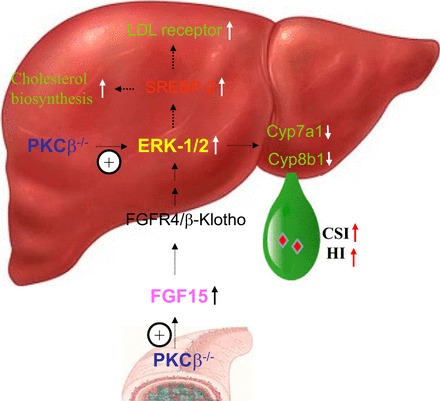Fig. 2.

Proposed model for the mechanism by which PKCβ acts as a major regulator of cholesterol homeostasis, allowing adaptation to high-fat/cholesterol intake. It appears that PKCβ defends hepatic cholesterol homeostasis by inducing cholesterol excretion pathways, while reducing cholesterol synthesis and uptake pathways. In such a way, PKCβ may modulate bile lipid composition and thus the susceptibility to cholesterol gallstone formation. The underlying mechanism is consistent with a 2-pronged mechanism by which PKCβ deficiency contributes to dysfunctional cholesterol homeostasis through disturbing PKCβ/FGF15/ERK and Raf-1/MEK/ERK regulatory axes critical for hepatic and systemic cholesterol homeostasis. Emerging evidence indicates that these nuclear receptors have essential roles not only in the regulation of cholesterol and bile acid metabolism, but also in the integration of sterol, fatty acid, and glucose metabolism. CSI, bile cholesterol saturation index; HI, bile hydrophobicity index.
